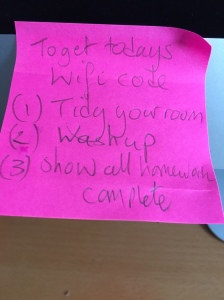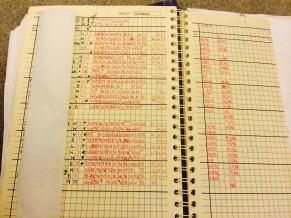As a classroom teacher for a generation, I’ve always set homework, doable, purposeful homework. As a chemistry teacher my favourites involve some experiments at home ( testing pH etc) but I do like research too – it’s what we chemists do of course. Many a pupil having loved to ‘find out’ – they either tell you so or else their work is the proof. But frankly there is a lot of bread and butter homework too: finish this, annotate that, read up here, a test on that…..
Homework itself covers a multitude of activity and areas, the debate over primary pupils doing homework is likely to be different to those in key stage 4, so let’s try and be pragmatic. As a teacher I think there are lots of reasons for setting homework and they have to outweigh the hassle of ensuring its always done. My top reasons are to do with widening interest, bringing more enthusiasm and passion for my subject, getting a clearer understanding and testing that understanding and my worst reason is ‘following a school policy’. However as a senior leader I think it has to be articulated carefully to parents and children as to what they have this homework to do and a duty to make sure there is not too much, its active and manageable and support offered where necessary.
Our main reasons for setting homework are:
- To establish good habits and in due time to help create independent learners amongst our students.
- To complete activities and work that aren’t covered in a lesson or are carefully designed by teachers to enhance learning.
- Because we think children can expand their horizons with some learning activities done outside the classroom.
- There isn’t enough time in school (25 hours) to do everything and we like to offer as broad a range of curriculum as possible. So there really isn’t enough time
- Homework works – it helps to deliver success.
- The government and Ofsted seem to think it’s a good idea and actually so did our pupils too!Academic research concludes: “homework contributes to achievement at secondary level and the effect is stronger amongst older pupils”.
- it might just help build self-respect and some resilience
So during the 2015-16 academic year we carried out some simple and definitely non-scientific research into an important aspect of our school life homework. this at a time when some schools declared NO HOMEWORK
 We began by asking our pupils a series of questions – we did make an important assumption that our community of parents, pupils and teachers see a value in homework so this wasn’t about forgetting or abandoning homework. It was more to pinpoint any stressful areas for each group and see what improvements we might make.
We began by asking our pupils a series of questions – we did make an important assumption that our community of parents, pupils and teachers see a value in homework so this wasn’t about forgetting or abandoning homework. It was more to pinpoint any stressful areas for each group and see what improvements we might make.
Understanding the importance pupils attached to doing homework was pleasing to read and we were even more encouraged by the number of responses and the ‘common sense’ shown by everyone. A few pupils managed to contradict themselves but the general message was ‘homework routines are about right’.
 The following action points came from the pupils:
The following action points came from the pupils:
- Please set homework early in the lesson and not in a rush at the end.
- Please set realistic deadlines–sometimes all our teachers set homework with short deadlines.
- When we have two teachers in a subject (e.g. in Geography or in most sixth form lessons) please don’t overload us.
- Make it clear how we can get help in your subject.
- If teachers can do so, please balance harder homework tasks with easier ones and longer tasks with shorter ones.
We discussed these with teachers and most are achievable and manageable. However, for different subjects there are different issues for example, number 4 above, some pupils found it difficult to log onto a site in a subject, but some just found the content difficult, so they each need a different type of ‘help’. We were pleased to see there wasn’t very much moaning about ‘worthless activities’ which showed pupils value their homework and our teachers avoid time-wasting undertakings. We were proud that our pupils approached homework (and the survey) in such a mature manner.
Parental responses were high: 59% Y7; 70% Y8; 64% Y9; 71% Y10; 25% Y11; 17% Y12&13. We expected the sixth form and parents of older students to give a different response as their private study work is completely understood to be intimate with their work in lessons and a huge factor in any success in those very demanding post 16 lessons or in order to aim higher with success at GCSE.
 The following action points came from parents.
The following action points came from parents.
- Please could teachers spend some time explaining how to revise and study your subject?
- Can teachers avoid ‘research’ which is just a general “use the internet.” If possible give some specific websites to work from.
- If teachers know useful books or other resources please tell pupils about them.
- When there are two teachers in a subject (say in Geography or in most Sixth Form lessons), please do not overload the students. Communicate with colleagues if you share a class.
- Be realistic about the amount of time a homework task might take.
- Try not to overload pupils with too much holiday homework.
- Please try to turn around homework/give feedback fairly quickly but at least in a reasonable time.
Once again we think these are all manageable and we are pleased so many parents are involved checking books or checking diaries and of course giving support and help on occasions. Most homework is communicated to our parents via a child’s contact book even if that says“science homework–see exercise book”. We understand sometimes as a school we seem to say homework isn’t complete and that a parent may not know what it is the child hasn’t completed. Occasionally parents ask us to email the work. In very exceptional circumstances we might consider that but it is quite onerous and we are in danger of the pupil being left out. It is the pupil who needs to be clear and if he or she is struggling we should attend to those reasons which might range from confusions through lack of understanding to…laziness. There are several ways we think parents can help:
- encourage a good attitude to learning the value in doing some further study beyond school lessons
- helping with routines to do homework, a space at home or a time and of course a look over books and an interest in the work being done
- support the work – don’t do it for them but for example if a pupil is stuck often it is follow up work from what was done in the lesson have a look over the material a few pages earlier in exercise and text books
- help pupils to see homework enhances what they did in the lesson.
Finally, in our survey/research we put these points to staff and had about 80% response:
- They agreed there could be inconsistency across subjects about how much homework is set (e.g a subject seeing pupils once a week might not be able to set homework every week).
- There is a workload issue – we try to turn work around in a reasonable time but it can be a challenge at certain periods e.g. If a teacher has other classes who are preparing for exams, or when we are writing reports. We don’t want to ‘not set’ work.
- A lot of teacher time goes on chasing up homework – often it’s the same pupils and often despite sanctions.
- There is extra help available during lessons or lunchtime and after school–quite a lot of pupils don’t take up the opportunity.
- Homework often looks like it’s been left to the last-minute and is rushed.
- Some of our pupils need to see their homework as important, shown by:
- Handing it in on time.
- Understanding there is less help if we are chasing you, more help if you try to more progress that way too. No one was ever shouted at for not understanding.
- Not being rushed.
- Being properly completed – including being well presented.
- Not being just copied and pasted from the internet.

We will be trying to make sure teachers explain clearly what to do if pupils are stuck with homework. We have a homework club after school each day Monday to Thursday from 3.30 to 4.30 with staff and Sixth formers supervising,there are even refreshments. This club operates for Y7/Y8/Y9. For other years there is a similar arrangement but students work on their own and in silence using the facilities in the School library. Again research shows attendance at school based study support is associated with positive effects.
Overall, it was good to see a general confirmation of the processes we use and a common understanding of the value (and snags) with homework. A big thank you to everyone who contributed.
….and for the few cycnics check out this story of the boy who did homework by the light of a local McDonalds in Cebu the Philipines
Some Questions
Q1 How does your school encourage pupils to engage in homework?
Q2 Are there other benefits to setting homework and are there other annoyances?
Q3 What other ways might we help young people become lifelong learners?